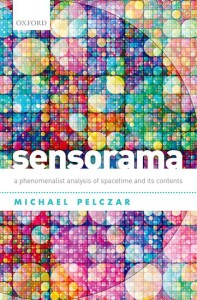 In May 2015, Oxford UK published my first book, Sensorama: A Phenomenalist Analysis of Spacetime and Its Contents. The perfect gift for the metaphysician, philosopher of science, or philosopher of mind in your life, it’s worth buying for the cover art alone (well…you know what I mean). Purchase a copy from your neighborhood bookseller, or from one of these fine online vendors: Amazon, OUP.
In May 2015, Oxford UK published my first book, Sensorama: A Phenomenalist Analysis of Spacetime and Its Contents. The perfect gift for the metaphysician, philosopher of science, or philosopher of mind in your life, it’s worth buying for the cover art alone (well…you know what I mean). Purchase a copy from your neighborhood bookseller, or from one of these fine online vendors: Amazon, OUP.
If you want to test the water before taking the plunge, take a look at this paper, which distills the book’s central message.
To learn more about who the author is—and isn’t!—click here.
What they are saying about Sensorama:
Jonathan Simon: review in Notre Dame Philosophical Reviews
There are few in contemporary analytic philosophy willing to defend phenomenalism, the view that physical objects reduce to permanent possibilities of sensation, and fewer still who are willing to give time the same treatment. Michael Pelczar is the exception. In this book, he offers an engaging, unflinching defense of an ambitious form of neo-Millian idealism, radical phenomenalism, according to which spacetime and its contents (and also selves and intentionality) are logical constructions out of experiences and counterfactuals involving them.
Laura Gow: book note in Australasian Journal of Philosophy
Pelczar’s theory is an exciting addition to the debate surrounding the relationship between consciousness and spacetime.
Gene Mills: commentary in Analysis:
Sensorama is a beautiful and refreshing book. Its beauty lives in its architectural lines, in its intricacy of detail, and in its attempt at an overarching metaphysical system that evokes the great systematic philosophers of the past. It refreshes with its originality, its general rigour in reasoning and its audacious disregard for current philosophical trends and fashions. It also exemplifies the more mundane virtues of good philosophical writing: clarity of expression and of argumentation.
Kevin Morris: commentary in Analysis:
Despite my worries about phenomenalist metaphysics, I will conclude by emphasizing that Sensorama is nonetheless an important and often highly original book, and that Pelczar does an admirable job arguing that phenomenalism, and idealist conceptions of reality, ought to be taken seriously as comprehensive outlooks about the place of mind in the world.
Geoff Lee: commentary in Analysis:
Mill believed that the physical world is nothing more than potential for experience. The existence of a banana in my fruit basket consists (at least roughly speaking) in nothing more than the fact that I would experience this banana were I to look in the basket. The same is true for the existence of anything else in the physical world. Needless to say, this radical form of idealism has not caught on; it is widely believed that there are insurmountable problems that any attempt to develop the position will face. So it is surprising, and refreshing, to find that Michael Pelczar has devoted an entire book to developing and defending a version of the Millian idealist metaphysics.
What they would have been saying about Sensorama:
Why didn’t I think of that?
—Rudolf Carnap, UCLA
Sensorama has renewed my faith in the Now.
—Albert Einstein, Institute for Advanced Study
Well, it’s about time.
—Bertrand Russell, University of Cambridge
There is much here that is correct and close to my own view.
—Gottfried Leibniz, House of Brunswick
I told you so.
—John Stuart Mill, University of St. Andrews